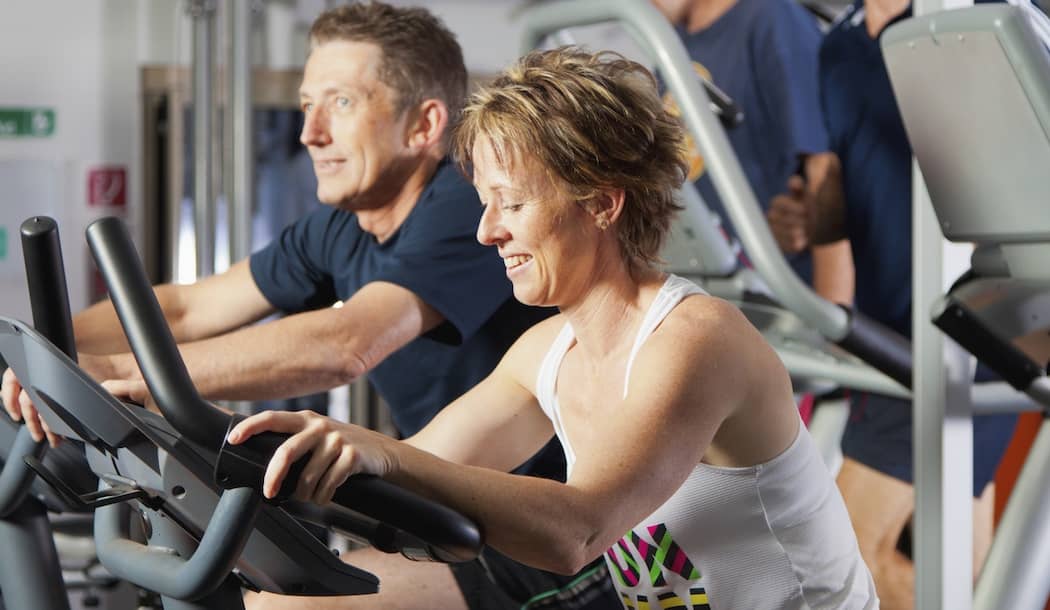
In a study published recently in the journal Aging Cell, researchers compared male and female amateur cyclists, age 55 to 79, with similar individuals who seldom or never exercised. As expected, the cyclists had more muscle and less fat than the non-exercising group.
But along with general fitness, the cyclists also had better, healthier, younger-looking immune systems.
Surprised? Don’t be. When it comes to the benefits of exercise, the immune system boost is just a tiny hint of what you get in return for your effort.
I’ve come to the conclusion – reluctantly, since I’m a sedentary type – that exercise is the most powerful medicine on earth. The evidence is so overwhelming, it’s been enough to get me out of my chair almost every day this last few years.
For example, if your memory is slipping, here’s what exercise can do. . .
A study published just a few weeks ago from the journal Neurology had an empowering take on dementia. Whereas many studies on dementia leave you feeling helpless in the hands of your genetics, this one highlights the benefits of being fit.
For 44 years, researchers from the University of Gothenburg in Sweden followed 191 women, starting when they were age 50. What they found was that on average, women who were physically fit when they were middle-aged were 88% less likely to fall prey to dementia when compared with women who were unfit.
This doesn’t mean lack of exercise causes dementia; it’s one factor. But the link is particularly strong, and the evidence for exercise doesn’t stop there. Getting back to the immune system, let’s consider the thymus gland.
Younger T cells: Your first line of defense against cancer
In healthy people, the thymus starts to shrink around the age of 20. This is not good, because the thymus is in charge of making your T cells, a specific type of immune cell that fights off potential invaders (like cancer cells). When your thymus starts to shrink, the production of T cells slows down.
The researchers who studied the 55-and-up cyclists I mentioned earlier were fascinated to find that the older cyclists’ thymus glands hadn’t aged. Their thymus glands looked like the ones you’d find in younger people, and their T cell output was the same as what you’d see in a younger person.
So. . .aerobic exercise is clearly a boon for your body. Here’s another surprising effect of aerobic workouts: They have a positive impact on the health of your gut.
Your gut will be happier (and I don’t mean belly fat)
More and more, we’re coming across research that links the microbes in your gut to your overall health. And a lot of things play a role in keeping those microbes healthy – particularly your diet and the amount of plant-based foods you eat. Now scientists are finding that exercise boosts your gut microbes, too.
Along with helping you digest food, your gut microbes affect the level of inflammation in your body. That’s important, because inflammation is often an early sign of illness or disease.
In a study published in the journal Medicine & Science in Sports Exercise, a team of scientists recruited 32 volunteers of varying weight levels who were essentially sedentary. The researchers had them exercise three days a week for six weeks. After that, the participants were told to go back to their inactive lifestyles for six weeks.
Through fecal samples, the researchers looked at microbes in the participants’ guts at the beginning of the study, again right after the six-week exercise program and one more time following the six weeks of no exercise.
What they found spoke volumes: After six weeks of exercise, each participant had a marked increase in their concentrations of butyrate, an important fatty acid produced by “good” bacteria in the colon.
Butyrate keeps your gut happy by generating energy and lowering inflammation. It protects against colon cancer. The most significant increase in butyrate was in the lean participant group, though levels picked up modestly among participants who were overweight.
This shows that your microbiome responds differently to aerobic exercise depending on whether you’re lean or obese, but the bottom line is that aerobic exercise keeps your microbiome happy, which tamps down inflammation levels, which lowers your risk of cancer and other insidious diseases.
It even helps with “chemo brain”
Aerobic workouts also appear to help cancer survivors who endured chemotherapy treatments and suffer from “chemo brain,” a side effect including memory loss and trouble focusing.
A study published in Breast Cancer Research and Treatment detailed the effect of exercise on nearly 300 breast cancer survivors. Each survivor was given an accelerometer to track activity levels and an iPad app with quizzes designed to measure memory and attention levels.
After a week, the survivors who did aerobic exercise every day not only performed better on the app quizzes, they also felt less tired.
“Get moving” is the big takeaway here. But the trick is to make your exercise plan something you’ll actually do, and without fail. Choose something you enjoy to give yourself a greater chance to stick with it. Planning ahead and putting your workouts on your calendar is another approach that makes it more likely you’ll follow through.
I’m not fond of the word “workout,” which already makes the whole business sound hard. A half hour walk a day – preferably in nature – confers just about as many benefits as an all-out sweat-buster in a gym.
And thanks to our digital world, there are hundreds of apps that can remind you to exercise, walk you through different exercises, or cheer you on as you’re exercising (several running apps have this feature).
The bottom line? Just do it. Your body will thank you, and you’ll thank yourself when you remain disease-free and healthy.
Best regards,

Lee Euler,
Publisher